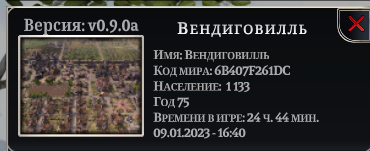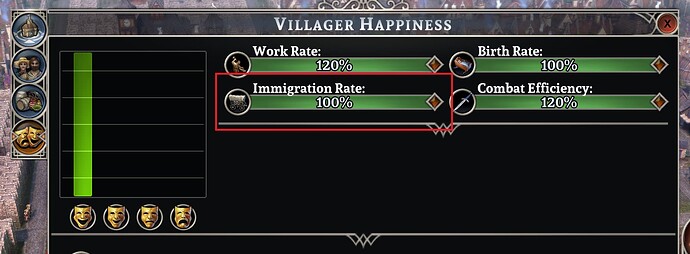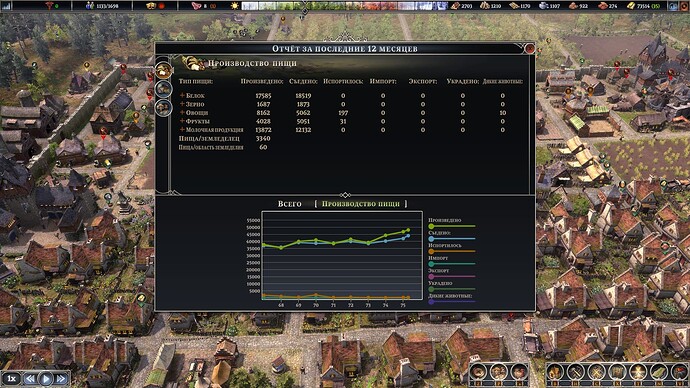Sometimes my map is going way too well and I am like, dear villagers you have 20,000 beans, please eat some I beg you. It would be kind of nice if we could sell some of that excess beans/wheat/berries/etc to the merchants.
If you have a lot of berries, make canned food and sell them. Instead of beans, grow root vegetables, they can also be canned. Lots of wheat, then make flour, it seems like you can sell it (but I’m not sure about that). You can also sell cheese.
Or you could also disable some of the production: more storage, less spoilage, more workforce
Thing is, your birth and immigration rates are proportional to your food supply.
The more food you produce, the faster the growth of your town. So I get why some players want to produce as much food as possible, to get more workforce available in the city pretty fast.
Beans and greens are spoiling quite fast, but beans keep your fields fertile, so I wouldnt’ worry too much about them going bad. You could produce carrots and turnips instead of greens though, and them pickle them.
Also, try moving some of the farmers to work in a barn and produce milk + meat instead of growing vegetables on a field. Milk can be turned into cheese and meat can be dried, so they will last longer than vegetables.
Oh really? I had no idea the amount of food had an impact on your town’s growth. Good to know! ![]()
It is not an absolute rule, but if your population is happy I found that the number of births were usually following the amount of available food, that is the difference between produced food and spoiled food (expressed in months).
For instance, you have a food supply of 8 months, with an equivalent quantity of 2 months of supply that is going to turn bad (red number). You could expect about 6 children to be born for every birth’s wave (4 times a year).
Thanks for clarifying ![]()
It used to be that the food excess also directly affected Migration: less than 6 months’ supply on hand pretty much meant no major immigration at all. That does not seem to be as true any more, because I have gotten groups of 7 - 11 Immigrants even when the food in storage amounted to less than 6 month’s worth - but when the stored food drops to 1 - 2 months, immigration still also seems to stop.
Just a thought, wouldn’t immigration rate as well as birth rate by affected only be these numbers?
No matter if you have 3 months or 20 months of food available, if your villagers are happy and their needs are satisfied the rate should be 100% and that is the one factor affecting immigration and birth.
I confess, I have never paid much attention to Villager Happiness as long as they weren’t drunk and rioting. On the other hand, as stated earlier, before the latest 9.0 and 9.1 playtest it was pretty much rigid: you needed at least 6 months’ food on hand AND at least 25 - 50% excess housing on hand or Immigration was a trickle of 1 - 3 people per year and birth rates also no more than 2 - 6 or about 2% of the total population.
Now, since 9.0 came out, I’ve noticed that even with as little as 3 - 4 months’ food on hand I will occasionally get a group of 7 - 11 immigrants show up - not every year - but that I get that kind of group at all is surprisingly different from what happened earlier.
Excess Housing still seems to be an absolute requirement: the last two times I got an Immigrant Group I had about 33% excess housing (160 total housing for a population of 120 or so).
They had, I believe, said that they were addressing the abysmally low birth rate that set in after the population got above 700 - 800, but I haven’t had time to build up a town to that size yet in 9.1 to see how well that has been corrected. The increase in immigration is definitely something new in my experience, though, and helps to avoid the stagnant population that used to set in and remain for years as you struggled to get above about 800 or so population. I remember keeping track, and for 10 years my net population increase was 11 people starting from a base of 800 - and that was combined immigration and birth rate: horribly frustrating.
It may have been a coincidence but I did notice as well that immigrants arrived more often when I had lots of extra housing. Although it has also happened that a bunch of them arrived and I had 0 homes available. :shrug:
Immigration seems to also depend on the size of your population. In the early game the immigration waves can be very big even if you have just a few months of food ahead. In 9.1 I’m pretty sure I got a wave of 25 immigrants in (happened a single time). Even if your food supplies get more important, in the late game every immigration wave is about 2 to 3 persons.
The last waves for my town of 1000p with 12 months of food supply and 2 equivalent months of spoilage were 2 persons.
When it comes to the rate bars that were shown in the screenshot, I’ve observed that a birth rate of 96% could be 3 babies, and 100% could be 5 or 9 babies. Not sure what to do with that.
I think it was over 6 months ago that I tried measuring immigration and birth rates by the percentages and just couldn’t find any direct relationship between the percentage figures and ‘raw’ numbers of births and immigrants, so I stopped paying any attention to the percentages.
When my town says it is short 3 Workers, having 3 immigrants is more important than having 95 - 100% immigration that translates into 1 - 4 immigrants at random.
And in previous additions (the 8.0 - 9.0 series) all population increase slowed to a near standstill when you got over about 700 - 800 population.I remember all too well keeping exact track of population track for about 10 years and discovering my average population increase - without counting losses to wild animals or raids - was about 1.5 per year no matter what I did in the way of providing food or housing. I estimated it would take over 130 years to get from 800 to 1000 population, which is why I gave up on that game: life’s too short to sit for hours waiting for individual settlers to wander in.
I offer two alternatives
- add a pig farm and a function - feed spoiled food to the pigs (those. pigs are automatically fed food that has either spoiled or will spoil in 30 days)
- dispose of spoiled products through a cesspool, as an option, add T3 improvement to the cesspool - saltpetre heap. This technology will be useful if the developer decides to add gunpowder and firearms to the game.
I really like the idea of the pig farm. Good one!
Here is my city for 75 years with a population of 1133. Built on patch 0.9.0a. Also during this time, ~400 residents died. So the process of city growth has been noticeably improved.

It is unlikely that the discussions concerned specifically food spoilage. But if this is really the case, then how is it the players’ mistake in the distribution of residents. I have a city of 1133 inhabitants. They consume 40,000+ provisions, with food spoilage amounting to 230 units. This is approximately 0.5% of the total. Is it worth spending time on developing and testing new mechanics for the sake of 0.5%? I think not.
PS If your food spoils, then first of all you need to ask yourself a question. Do I have an oversupply of food workers?
Thank you! That is indeed a far better population increase than I found with my old (started in 0.8) build.
Well, in my opinion, a special mechanic can be introduced for pigs - “disposal of spoiled products”
Those. In addition to basic feed, pigs may be fed food with an expiring shelf life.
If you add spoiled food to compost, it’s good, but if you feed it to pigs, it’s not so good. You build compost at the beginning of the game and immediately reap the benefits. To benefit from pigs, you need to invest resources. From pigs you get meat, skin, fat and everything. Cows give everything the same, as well as milk/cheese. Cheese is an additional variety of food and can also be sold. And from pigs you will have meat of which there is already a lot of meat in the game. I also have no problem with spoiled food, I would have to feed the pigs regular food. Instead of pigs, I would prefer to add chickens. From them you can get eggs that are already in the game, as well as feathers. But eggs spoil quickly, they need to be cooked somehow.

